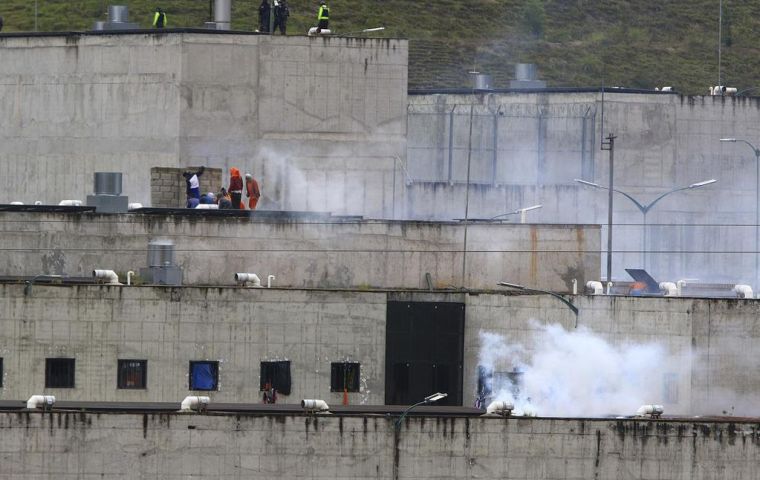MercoPress. South Atlantic News Agency
Pardons and deportations granted to reduce overcrowding at Ecuador's jails
 Up to 5,000 inmates are to be released shortly as per the new measures
Up to 5,000 inmates are to be released shortly as per the new measures Pardons and deportations granted to reduce overcrowding at Ecuador's jails Government of Ecuador have decreed a series of pardons and extraditions of prison inmates in a move aimed at reducing overcrowding at detention facilities following a series of deadly riots this year which has cost over 230 lives, it was announced.
Around 40,000 prisoners are living in Ecuador's 33 jailhouses, which have a combined capacity of up to 28,000 inmates. Hence, overcrowding has become one of the country's primary targets to curb violence across penitentiaries.
The Litoral detention centre in Guayaquil is particularly critical. Designed to house 5,200 prisoners, it is currently home to 8,542 people, which means overcrowding is 62.8%.
In this scenario, the Government of President Guillermo Lasso has begun a process of pardons and deportations.
In the case of pardons, Decree 264 was issued, which benefits “every person who has been sentenced for the offences outlined in articles 383 and 386 of the Comprehensive Organic Penal Code, COIP.” In other words, the measure benefits people sentenced for traffic offences that did not result in death or injury. Meanwhile, Decree 265 grants a pardon to people with terminal illnesses, multidrug-resistant tuberculosis and/or with a TB - HIV infection. In both cases, applicable civil reparations stand.
On Nov. 13, 68 inmates died in the Litoral Penitentiary, 49 of whom were detained in the Transitoria area, which housed the perpetrators of minor crimes, traffic accidents, financial crimes and even alimony debtors. Experts have also agreed on the need to reduce incarceration to a minimum, including the excessive use of pretrial detention.
According to official data, 42% of those under arrest have not received a conclusive sentence and are in going through judicial processes, which make take years.
The other significant measure to reduce prison overcrowding was the expulsion of foreign convicts. Around 5,000 of the country's prison population is believed to be from Colombia, Venezuela, Mexico and Peru.
The first step in that direction was announced on Nov. 21, during the visit of Colombian President Iván Duque, with whom the repatriation of 170 detainees was agreed. Binational agreements are key since the willingness of the country of origin to receive their nationals is required.
However, there were voices against that alternative because some fear it would send a message to potential criminals that if they are caught they would just be sent back home.
According to the Ecuadorian Government, up to 5,000 inmates could be released over the next few days as per these measures.




Top Comments
Disclaimer & comment rulesCommenting for this story is now closed.
If you have a Facebook account, become a fan and comment on our Facebook Page!